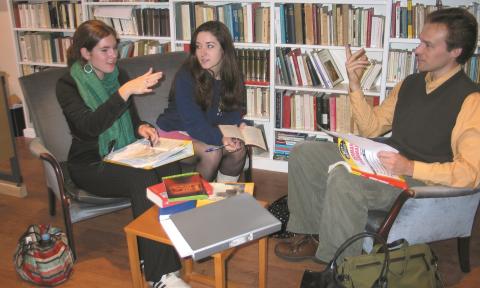The study of Czech – with closely related Slovak – is a gateway to the rich culture and turbulent history of Central Europe and an ideal introduction to the Slavonic languages. The Czechs and their magnificent capital city, Prague, have found themselves at the centre of Europe’s most dramatic episodes, from the Holy Roman Empire, the Reformation, the Habsburgs and the Thirty Years War to Nazism and the Cold War. Nearly all our students start Czech from scratch, and achieve excellent, graduate-level competence over four years alongside an advanced reading knowledge of Slovak.
Czech with Slovak is a distinctive version of the traditional modern languages degree, enabling you to discover the languages and cultures of smaller European nations that have not built empires, but instead created, negotiated and preserved their identities and culture within and alongside them. Graduates of Czech are viewed as exceptional linguists, with a rare, valuable version of an essential and well-understood skill-set, prized in careers as varied as business, finance, law, diplomacy, international aid and development, the armed forces, security services, interpreting, publishing, journalism and teaching.
Oxford is the leading centre in the UK for the study of Czech and Slovak language, linguistics and literature to honours degree level and beyond. We are one of very few universities in the world where you can explore Czech-language literature from 1314 to the present day, and Slovak literature from the 1840s to the present, in a wide range of historical and cultural contexts. You can also study the historical development and contemporary state of the Czech and Slovak languages.
The Faculty is also a lively hub for Czech- and Slovak-related events, which bring together students and tutors of Czech and Slovak or of Czech, Slovak and Central and East European history and politics, and students from the Czech Republic and Slovakia from throughout the university. We work closely with, among others, the Czech Centre and Czech and Slovak embassies in London to host regular visiting speakers from or connected with the Czech Republic or Slovakia. In recent years, these have included the Czech and Slovak ambassadors to the UK, leading academics including Professor Jonathan Bolton (Harvard, Taylor Lecture 2019-20) on the political novel and Professor Libuše Heczková (Charles University, Prague, 2023-24 Ilchester Lecture) on twentieth-century Czechoslovak feminist intellectuals, and workshops and Q&As with writers and translators including Jáchym Topol, Nicol Hochholczerová, Daniela Kapitáňová, Julia Sherwood and Alex Zucker, often in conjunction with the Queen's Translation Exchange.
If you have any questions about studying Czech and Slovak at Oxford at any level, please don't hesitate to contact Dr Rajendra Chitnis: rajendra.chitnis@mod-langs.ox.ac.uk Current undergraduates seeking information about their course should consult the relevant Czech with Slovak pages on Canvas.

Undergraduate Studies

Graduate Studies

Research